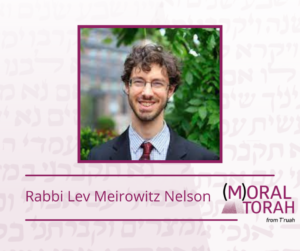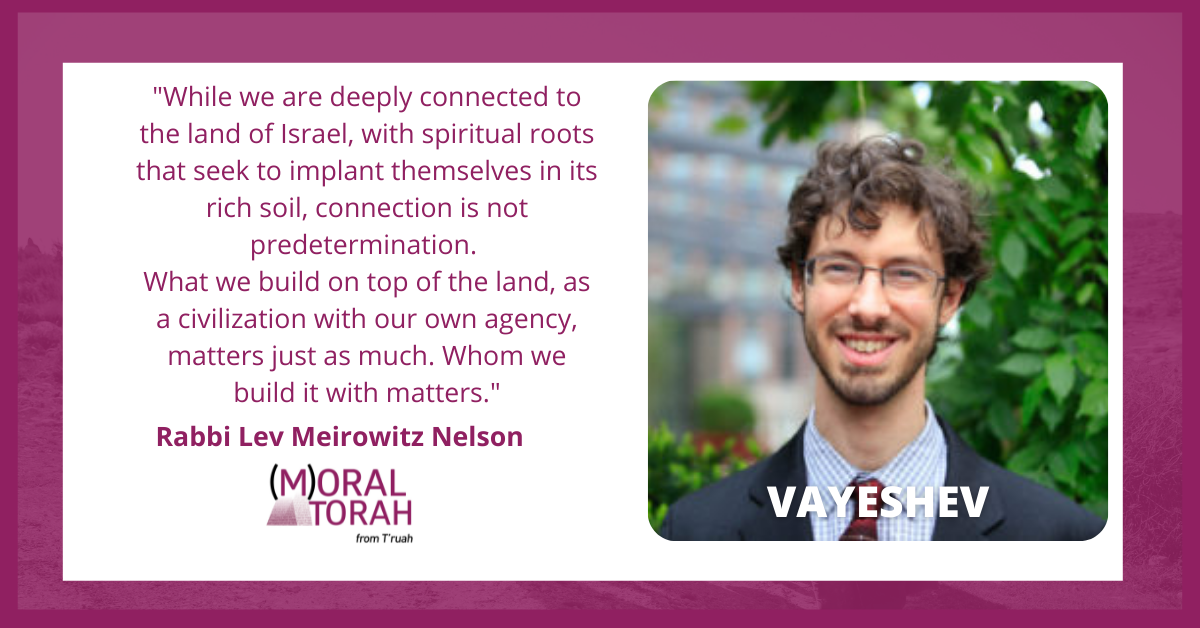>> Plant Two Trees for Justice with T’ruah
A D’var Torah for Parshat Vayeshev by Rabbi Lev Meirowitz Nelson
The Joseph saga, which begins this week and continues through the rest of the Book of Genesis, plays out against an agricultural backdrop. Within the first seven verses of this week’s parshah, Joseph has his first dream, of him and his brothers gathering sheaves of wheat in the field. Next week, he will interpret Pharaoh’s dreams to mean seven years of bountiful harvests followed by seven years of famine. Joseph’s brothers will go down to Egypt to buy the grain they cannot grow in parched Canaan, and the rest is history. While our patriarchs may have identified first and foremost as shepherds, they were clearly also farmers.
It’s particularly interesting to read this narrative in a shmita year like this one. The Torah commands — in Exodus 23:10-11 and Leviticus 25 — that every seven years Jews in the land of Israel pause their agricultural work. (This echoes Pharaoh’s dreams even if the connection is not explicit.) No planting, no harvesting, equal access for all to that which grows on its own.
In the modern State of Israel, most everyone relies on a clever rabbinic workaround: Jewish-owned fields are collectively sold to a non-Jew for the year, thus removing them from the obligations of shmita and enabling the economy and the food sector to operate as usual.
Sign up to receive (M)oral Torah in your inbox each week.
For T’ruah, shmita takes on particular relevance. Every year, the rabbinical and cantorial students studying in Israel plant two sets of trees — one in the West Bank, to benefit a Palestinian community, and one inside Israel proper, for the mutual benefit of Israeli Jews and Palestinians. Can we continue that annual tradition this year?
In analyzing the question, we relied on two sources. One is a teshuvah (ruling) by Rav Shlomo Goren, who was Israel’s Ashkenazi Chief Rabbi from 1973-1983, written sometime between 1980 and his death in 1994. The other is a short paper written this year for Rabbis for Human Rights by Rabbi Koby Weiss.
Rav Goren was asked if land in the West Bank needs to be included in the national shmita bill of sale, like land inside Israel proper. He approaches the question from a political perspective opposite to T’ruah’s, full of laments that Israel has not annexed the West Bank. In his mind, there are two levels of ownership over land, both of which are necessary for land to be considered “Jewish”: local ownership of an individual and state sovereignty over the territory. According to the majority of past generations’ rulings, the “holding” that our ancestors established in the land of Israel expired when they went into exile. Therefore, because the modern State of Israel has not extended full sovereignty over the West Bank, this societal level is absent. Rav Goren here gives surprisingly great deference to the weight of international law, admitting that the West Bank remains under Jordanian or Ottoman law and therefore not subject to shmita.
Rav Goren also cites a minority view that the ancestral land claim is eternal and unbreakable. This school of thought, however, holds that private land ownership in Israel cannot be reestablished until the messianic era; until then, any dwelling in the land is conditional. By both views, Palestinian-owned land in the West Bank — even land to which Jews unmistakably have a strong historical and emotional connection, like Hebron — is in fact Palestinian and therefore not subject to shmita.
As a corollary argument, Rav Goren points out that conquering the land of Israel is a “mitzvah d’oraita,” stemming directly from the Torah, while today shmita is only “derabbanan,” stemming from rabbinic authority. When presented with a conflict between the two, we are authorized to transgress a mitzvah derabbanan because it is overridden by the greater authority of the Torah. One of the ways to demonstrate conquest is by working the land. Rav Goren wants to allow Jews to do such work to facilitate our “conquest.” Indeed, such an argument was made in court this year by a settler group under order of evacuation. They claimed they could not leave their trees for Palestinians to enjoy, and they are halachically prohibited from uprooting the trees during a shmita year; therefore, they were petitioning for the evacuation to be delayed until next year.
Find more commentaries on Vayeshev.
Applying the same logic, since we want to strengthen Palestinians’ claim to their own land, helping them do agricultural work is a way to deploy the symbolic power of halacha in pursuit of justice.
Writing for Rabbis for Human Rights, Rabbi Weiss’s most important contribution on top of Rav Goren is that part of the prohibition on planting during shmita is to avoid marit ayin, a halachic concept where something looks forbidden even if it’s technically OK. This might be a concern for someone working in an Israeli field that has been sold for the year. (The sale would not be immediately obvious.) But, Weiss argues, for a delegation of Jews (Israeli or international) to travel to the West Bank and participate in tree-planting under the banner of a rabbinic human rights organization, there could not possibly be any confusion for an observer about what is going on. The symbolic nature of the work is clear, because the symbolism matters at least as much as the economic labor being performed.
And what about inside Israel proper? For the last few years, our partner has been Muslala, a multiethnic NGO of artists that among other projects runs a rooftop community garden in West Jerusalem. It seems, from a quick glance at halachic writing on the topic, that a rooftop garden is not technically connected to the “land” of Israel — it is considered like an indoor potted plant, which may be tended during shmita so long as the pot’s holes aren’t big enough for the roots to creep out and dig themselves into the dirt. This, too, dodges the shmita rules.
And this, too, is a symbol. While we are deeply connected to the land of Israel, with spiritual roots that seek to implant themselves in its rich soil, connection is not predetermination.  What we build on top of the land, as a civilization with our own agency, matters just as much. Whom we build it with matters.
What we build on top of the land, as a civilization with our own agency, matters just as much. Whom we build it with matters.
T’ruah will be proud to invite our rabbinical and cantorial students to plant trees in the West Bank and at Muslala this coming Tu BiShvat.
With thanks to Rabbi Atara Cohen, Rabbi Jill Jacobs, and Rabbi David Wolkenfeld for their help unpacking the Goren and Weiss sources. Any errors are my own.
Rabbi Lev Meirowitz Nelson is Director of Leadership and Learning at T’ruah. In that capacity, his responsibilities include editing (M)oral Torah and overseeing T’ruah’s programs for rabbinical and cantorial students.

